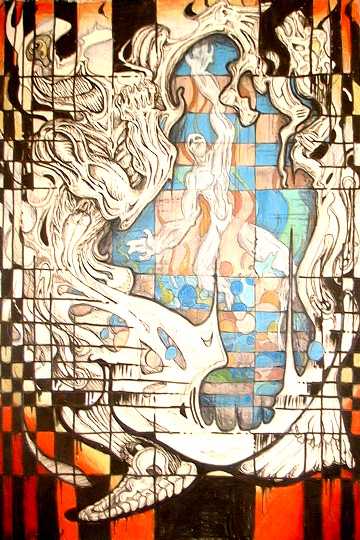
“The nature of consciousness is sheer luminosity, mere experience; it is the primordial knowing faculty, and therefore it cannot be produced from matter whose nature is different.” — His Holiness the XIV Dalai Lama
From Dreams to Self Understanding
By Silvana Ivin-Amar
As I get deeper into the study of dreams, into C. Jung and into my own thoughts, I am beginning to develop a better understanding of who I am as a total human being. The point of it all is really self identity and self understanding. For a long time now, people have been talking and writing about the ego, the conscious and the unconscious. The spirit and the soul. In order for any of this to make sense, all of these concepts must somehow fit together. It is like having pieces of a puzzle in both hands and now needing to put it together. If the “putting together” is successful you can see the beautiful picture that is created from all the smaller parts.
The soul is the big picture. We are soul. The soul has the ability to travel in the realm of the collective unconscious and it does so in our dreams. However, not in all dreams. The soul it is also accessible through other means — such as prayer, meditation and contemplation. Thus, we are soul and we come from the realm of the collective unconscious, we return to it when we can and we ultimately return to it at the end (our own physical end).
We also have the ego. The ego is our personality and some manifestations of the soul in this life time and in this body. The ego is responsible for our daily functioning; it is our psychology and rationality. The ego has its own unconscious component. We call this our private unconscious. These are things outside of our conscious awareness but from the realm of this physical reality and of this life.
The ego rules the day and this conscious life. But our lives are directed or effected by unseen forces within ourselves. In order for a person to be very well developed, integrated and in balance — there needs to be an understanding of the various elements that create the total person. We need to acknowledge and recognize the ego — its conscious and unconscious components. We also need to give, at the minimum, equal time and respect to our soul. First to recognize the fact that we are more than a body and more than our egos. Then, try to develop our understanding of soul — or try to become intimate with it.
So many of us are completely out of balance. The world is a mess and individually we are a mess too. We attempt to address our problems by taking care of the ego. We go to therapy and we analyze and attempt to heal only the ego. This is helpful for only a short period of time and many of the symptoms and problems return to us full force. In order to achieve any permanent, or long lasting contentment and peacefulness we need to look at ourselves in our beautiful and very complex totality.
We need to heal not only our egos, which take care of our concrete problems, but also our souls, which are the source of any permanent feelings of love and health.
In our dreams we have the wonderful ability to transcend the physical world and to function as soul. We have the opportunity to tap into the collective unconscious and to have experiences which are enlightening. At times we remember these experiences and we attempt to understand them through dream analysis. When dreams are from the collective unconscious we say that they are archetypal in nature and decoding them may not be all that difficult. This is time consuming but not impossible to do.
Unfortunately, those of us that are firmly stuck in the ego during the day remember dreams that are from the ego during the night. The personal unconscious materials are remembered and analyzed and the individual may be satisfied by a simplistic dream interpretation. To develop a model of the human psyche in its totality is very, very difficult. To somehow diagram the four unequal components is something that I am thinking about and may have some insight about it in the future. It may be spherical in design and hopefully the diagram would be able to show interrelationship between all the parts.
It is possible to come to a greater level of understanding without dreams. However, it is not wise. Dreams are an irreplaceable source of information, inspiration and enlightenment. It is each persons responsibility to become familiar with their dreams. To think about them, to write them down, and to regularly attempt to understand the messages from their dreams. As you do this, your lives will become fuller and you will gain insight, not only into your daily life, but also into your soul!
Carl Jung
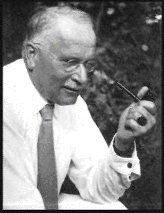
“The collective unconscious is common to all; it is the foundation of
what the ancients called the “sympathy of all things.” — CG Jung
Carl Gustav Jung lived from 1875 to 1961 and was a Swiss psychiatrist. In the early years, he worked in an asylum and was motivated by a desire to understand the human psyche. Freud and Jung were contemporaries. Jung was fascinated by Freud’s ideas about the unconscious and by his theories on dreams. Jung did not agree with Freud on many accounts and he independently research and developed an extensive theoretical framework regarding the structure of the human psyche and the nature of dreams. The foundation of Analytical psychology is the life’s work of Carl Jung. He was a prolific writer and was tenacious in his pursuit to understand the human condition. Jung’s work includes conventional and unconventional areas of study such as religion, alchemy and astrology.
In order to appreciate the theories and thoughts of C. G. Jung an individual must first have a general understanding, appreciation, and belief in the unconscious. It is difficult to explain the unconscious because it is not a concrete object. One can not hold it, look at it or examine it directly. It is something like wind. We can see its effects and can feel it, but we can not grab it in our hands and examine it. Science can not study the unconscious directly. The only proof of its existence can be found in the complex workings of the human mind and spirit.
To give the unconscious validity and power is a leap of faith. To believe in its existence is something like believing in a Higher Power. I don’t mean to suggest that the unconscious is like God. In my understanding, it is not. The unconscious is a very private and individual thing.Our dream material may come from this wonderful place that we have no access to during the day. The unconscious mind may have the power to connect us to other levels, or dimensions, of ourselves and eventually to everyone and everything else, including Divinity.C. G. Jung said that the unconscious is not necessarily smarter, but that it holds different information than our conscious mind. It enables us to see things that are at times difficult to understand and admit. The unconscious experiences that are revealed to us in dreams also allow freedom and mobility that would be impossible to obtain through the conscious mind. In a dream we can fly and there are virtually no limits to the possibilities in our dream experiences!
In the dream state we have an opportunity to access the PRIVATE and the COLLECTIVE unconscious. According to Carl Jung, the primary functions of dreams are:
- Dreams are a compensation for what is going on in daily life. They can serve as a positive or negative compensation. In this way, they attempt to balance the psyche. For example: If you experience unhappiness in daily life, you may have a blissful dream. If you are very successful in a specific area of life, you may have a dream about failure or disaster.
- Dreams provide a reaction to a traumatic experience. For example: If you were in a car accident, you may dream of it and the dream may be a repeat of this negative experience. People who suffered great trauma, such as rape victims or war veterans, may have nightmares that are exactly like or very similar to actual life events. As the individual assimilates these traumatic experiences, such dreams should become less and less frequent and may take another form.
- Dreams may be prophetic. Some dreams may provide the dreamer with glimpses into the future about small matters, while other dreams may reveal important events. However, keep in mind that most dreams are symbolic and not literal. Prophetic dreams may have an emotional or psychic charge that is different from other types of dreams.
- Dreams may be telepathic. In the American Heritage Dictionary, telepathy is defined as “communication through means other than the senses.” Telepathic dreams may be a means of communicating with others, as well as a path for one part of the dreamer’s psyche to communicate with another.
- Dreams may be mimetic of events occurring in the physical system or body. Thus, dreams may attempt to bring to consciousness an unknown illness or be a reflection of a current physical challenge.
Anatomy of a Dream
The following can be found in a book by C. G. Jung called Dreams.
An average dream appears to have a dramatic structure that can be examined and identified:
| Phase I | Phase 2 | Phase 3 |
| At the very beginning of a dream there is a statement of place and the protagonist is identified. Rarely is there a statement of time. This is the Phase of Exposition where there is an initial scene of action, all of the people involved are present, and the initial situation, or problem, of the dream is revealed. | In this part of the dream tension starts to build up. The situation in the dream becomes more complicated. The plot of the dream develops and there is much uncertainty as to the outcome of the situation. | Often the situation in the dream will suddenly change, or something decisive will happen. This phase of the dream is its culmination or peripeteia. |
| Phase 4 This phase is not always present in dreams. It is the solution to the dream dilemma, the result, or the lysis of the dream. This final outcome of the dream is a message from the unconscious mind to the conscious. If the dreamer does not get the message, or if the conscious mind does not get involved with the dream content, the unconscious mind will keep sending up same materials until they are noticed. Dreams are repetitive in their content and message. We are given many opportunities to pay attention and to get involved on the conscious level with the materials coming up from our unconscious. |
Selected lines from Walt Whitman’s –
The Sleepers
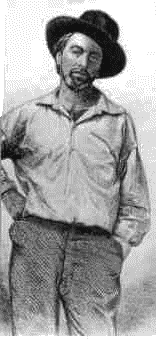
I wander all night in my vision,
Sleeping with light feet, swiftly and noiselessly stepping and stopping,
Bending with open eyes over the shut eyes of sleepers,
Wandering and confused, lost to myself, ill-assorted, con-tradictory,
Pausing, gazing, bending, and stopping.
………….
The married couple sleep calmly in their bed, he with his
palm on the hip of the wife, and she with her palm on
the hip of the husband,
The sisters sleep lovingly side by side in their bed,
The men sleep lovingly side by side in theirs,
And the mother sleep with her little child carefully wrapt.
The blind sleep, and the deaf and dumb sleep,
The prisoner sleeps well in the prison, the runaway son
sleeps,
The murderer that is to be hung next day, how does he
sleep?
And the murder’d person, how does he sleep?
………….
O love of summer, you are in the dream and in me,
Autumn and winter are in the dreams, the farmer goes
with his thrift,………
……….
Everyone that sleeps is beautiful, everything in the dim
light is beautiful,……..
Peace is always beautiful,
The myth of heaven indicates peace and light.
The myth of heaven indicates the soul,
The soul is always beautiful, it appears more or it appears
less, it comes or it lags behind,……….
The soul is always beautiful,
The universe is duly in order, every thing is in its place,……….
What has arrived is in its place and what waits shall be in
its place,
The sleepers that lived and died wait, the far advanced
are to go on in their turns, and the far behind are to
come on in their turns, ………
I too pass from the night,
I stay a while away O night, but I return to you again and
love you.
Why should I be afraid to trust myself to you?
I am not afraid, I have been well brought forward by you,
I love the rich running day, but I do not desert her in
whom I lay so long,
I know not how I came of you and I know not where I go
with you, but I know I came well and shall go well.
I will stop only a time with the night, and rise betimes,
I will duly pass the day O my mother, and duly return to
you.
Dream Land
By Edgar Allan Poe
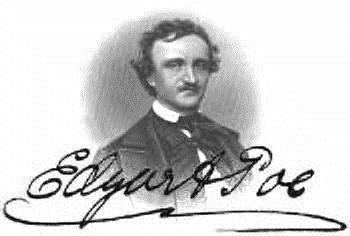
By a route obscure and lonely,
Haunted by ill angels only,
Where an Eidolon, named Night,
On a black throne reigns upright,
I have reached these lands but newly
From an ultimate dim Thule —
From a wild weird clime that lieth, sublime,
Out of SPACE — out of TIME.
Bottomless vales and boundless floods,
And chasms, and caves, and Titan woods,
With forms that no man can discover
For the tears that drip all over;
Mountains toppling evermore
Into seas without a shore;
Seas that restlessly aspire,
Surging, unto skies of fire;
Lakes that endlessly outspread
Their lone waters, lone and dead, —
Their still waters, still chilly
With the snows of the lolling lily.
By the lakes that thus outspread
Their lone waters, lone and dead, —
Their sad water, sad and chilly
With the snows of the lolling lily,
By the mountains — near the river
Murmuring lowly, murmuring ever, —
By the grey woods, — by the swamp
Where the toad and the newt encamp, —
By the dismal tarns and pools
Where dwell the Ghouls, —
By each spot the most unholy —
In each nook most melancholy, —
There the traveller meets, aghast,
Sheeted Memories of the Past —
Shrouded forms that start and sigh
For the spirit that walks in shadow
As they pass the wanderer by —
White-robed forms of friends long given,
In agony, to the Earth — and Heaven.
For the heart whose woes are legion
‘T is — oh, ‘t is an Eldorado!
But the traveller, travelling through it,
May not — dare not openly view it;
Never its mysteries are exposed
To the weak human eye unclosed;
So wills its King, who hath forbid
The uplifting of the fringed lid;
And thus the sad Soul that here passes
Beholds in but through darkened glasses.
By a route obscure and lonely,
Haunted by ill angels only,
Where an Eidolon, named Night,
On a black throne reigns upright,
I have wandered home but newly
From this ultimate dim Thule.
The Host of the Air
by William Butler Yeats
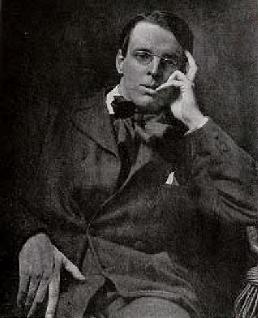
O’Driscoll drove with a song
The wild duck and the drake
From the tall and tufted reeds
Of the drear Hart Lake.
And he saw how the reeds grew dark
With the coming of night-tide,
And he dreamt of the long dim hair
Of Brigid his bride.
He heard as he sang and he dreamed
A piper, piping away
And never was piping so sad
And never was piping so gay.
And he saw young men and young girls
Dance in a level place,
And Brigid his bride among them,
With a sad and a gay face.
The dancers crowded around him
And many a sweet thing said,
And a young man brought him red wine,
And a young girl white bread.
But Brigid drew him by the sleeve
Away from the merry bands,
To old men playing at cards
With a twinkling of ancient hands.
The bread and the wine had a doom,
For these were the host of the air;
And he sat and he played in a dream
On her long dim hair.
He played with the merry old men
And he thought not of evil chance,
Until one bore Brigid his bride
Away to the merry dance.
He bore her way in his arms,
The handsomest young man there,
And his neck and his breast and his arms
Were drowned in her long dim hair.
O’Driscoll scattered the cards,
And out of his dream awoke
Old men and young men and youngs girls
Were gone like a drifting smoke.
But he heard, high up in the air
A piper piping away,
And never was piping so sad,
And never was piping so gay.
The Two Trees by William Butler Yeats
BELOVED, gaze in thine own heart,
The holy tree is growing there;
From joy the holy branches start,
And all the trembling flowers they bear
The changing colours of its fruit
Have dowered the stars with metry light;
The surety of its hidden root
Has planted quiet in the night;
The shaking of its leafy head
Has given the waves their melody,
And made my lips and music wed,
Murmuring a wizard song for thee.
There the Loves a circle go,
The flaming circle of our days,
Gyring, spiring to and fro
In those great ignorant leafy ways;
Remembering all that shaken hair
And how the winged sandals dart,
Thine eyes grow full of tender care:
Beloved, gaze in thine own heart.
Gaze no more in the bitter glass
The demons, with their subtle guile.
Lift up before us when they pass,
Or only gaze a little while;
For there a fatal image grows
That the stormy night receives,
Roots half hidden under snows,
Broken boughs and blackened leaves.
For ill things turn to barrenness
In the dim glass the demons hold,
The glass of outer weariness,
Made when God slept in times of old.
There, through the broken branches, go
The ravens of unresting thought;
Flying, crying, to and fro,
Cruel claw and hungry throat,
Or else they stand and sniff the wind,
And shake their ragged wings; alas!
Thy tender eyes grow all unkind:
Gaze no more in the bitter glass.
Beloved, gaze in thine own heart,
The holy tree is growing there;
From joy the holy branches start,
And all the trembling flowers they bear.
Remembering all that shaken hair,
And how the winged sandals dart.
Thine eyes grow full of tender care:
Beloved, gaze in thine own heart.